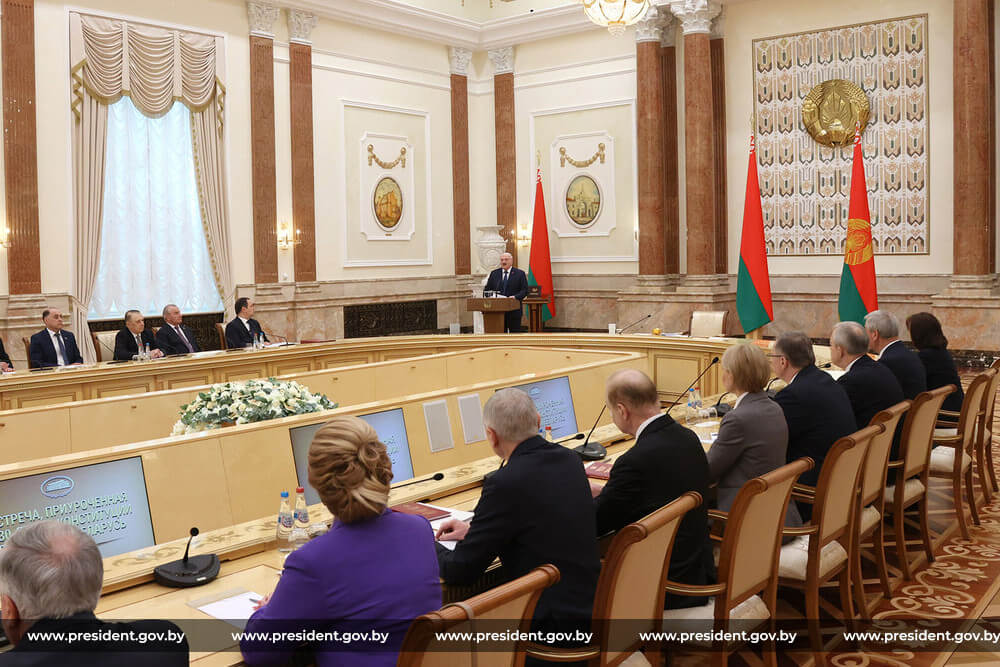Łukašenka compares people’s assembly to Połack veche

March 15, Pozirk. Alaksandar Łukašenka has drawn parallels between the All-Belarusian People’s Assembly and the Połack veche, a medieval legislature.
Łukašenka spoke to officials on Constitution Day, his press office reported.
He said the 10-12th-century Principality of Połack “created a mechanism to prevent authorities from losing the common touch with the people in the future.”
Assembly delegates have similar powers, he added.
“In the critical moments of history, they decided who will rule, who to trade with, and who to fight,” Łukašenka said.
“In modern terms, it was the veche that made the most important decisions on strategic development, not by the will of one man, the prince, but with the consent of the citizens”.
Łukašenka went on to criticize the 16th-century Statutes of Lithuania as “reflecting the interests of the rich and noble only, which further aggravated social inequality.”
He also spoke negatively of the Constitution of the Polish-Lithuanian Commonwealth, which he said did not protect “the rights of our people,” referring to the Belarusians.
“The period when our lands were in the Russian Empire did not leave any serious trace in the Belarusian legal tradition either,” he continued.
According to the strongman, “ideologically and conceptually, the Constitution of independent Belarus is the successor of the Constitution of the Socialist Soviet Republic of Byelorussia.” (Łukašenka likely meant the Byelorussian Soviet Socialist Republic, a later entity.)
The Supreme Soviet adopted the modern Constitution in 1994, defining Belarus as an independent democratic state.
Łukašenka tightened his grip on the country by amending the Constitution through controversial referenda in 1996, 2004 and 2022.
- Society
- Society
- PoliticsPolitically motivated convictions reported in Minsk, HrodnaThe material is available only to POZIRK+
- Politics, SecurityBelarus says it downs drones as Kyiv accuses Minsk of aiding Russian attacksThe material is available only to POZIRK+
- PoliticsMinsk to negotiate visa free travel to Saudi Arabia for officialsThe material is available only to POZIRK+
- Economy, PoliticsBelarus holds 496 Lithuanian trucks, 575 semi-trailers - LINAVAThe material is available only to POZIRK+
- Economy, Security, SocietyThree men jailed in Lithuania for smuggling cigarettes from BelarusThe material is available only to POZIRK+
- PoliticsKGB adds eight to list of terroristsThe material is available only to POZIRK+
- EconomyVacancies for foreigners rise by nearly 17 percent in Belarus over a monthThe material is available only to POZIRK+
- Security, SocietyLithuania turns nine African migrants back to BelarusThe material is available only to POZIRK+
- Politics, SecurityConscription-age men given 24 hours to report for military trainingThe material is available only to POZIRK+
- PoliticsFaction Biełarusy quits Coordination CouncilThe material is available only to POZIRK+
- PoliticsOpposition leader urges OSCE PA to establish working group on BelarusThe material is available only to POZIRK+
- Economy
- PoliticsEU Delegation welcomes Statkievič’s release, urges Minsk to free all jailed dissidentsThe material is available only to POZIRK+
- Politics
- Economy, Politics
- PoliticsInterior ministry designates 22 as extremistsThe material is available only to POZIRK+
- EconomyBiełstat: Belarusian companies’ CapEx down 6.1 percent in JanuaryThe material is available only to POZIRK+
- PoliticsEU sanctions extension to rule out Belarus potash transit – BudrysThe material is available only to POZIRK+



